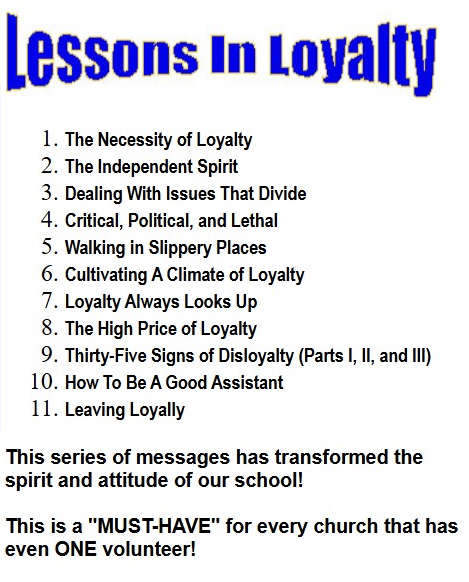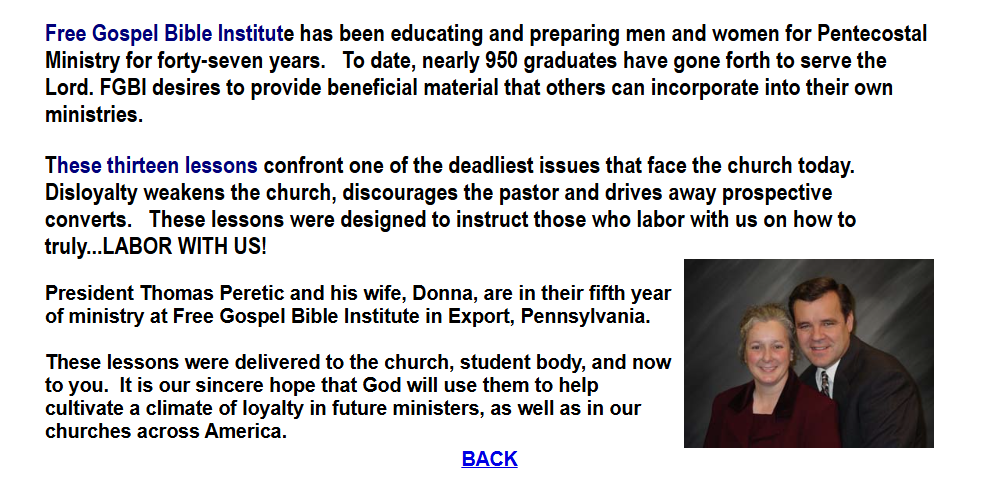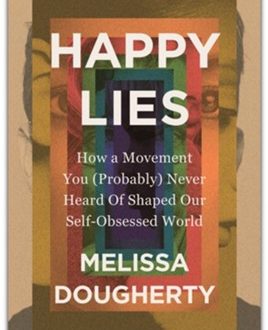
Loyal to a Lie: When Obedience to Man Replaces the Gospel of Christ
I’ll be honest and say that the sight of this cover still makes me shudder.
And I know I’m not the only one that feels this way.
I often wonder to what extent this series, and teachings like it, have shaped the Holiness Movement.
As I have spent the last several years disentangling from harmful teachings, my mind constantly harks back to this series.
As a barely 16-year-old freshman at Free Gospel Bible Institute, “loyalty,” as defined by these teachings, became the absolute core of my belief system.
Not the Gospel.
Not the authority of Scripture.
Not the faithful handling of Scripture.
Not the character and nature of God.
Not the person and work of Jesus Christ.
But “loyalty”.
Loyalty to a spiritual authority.
These teachings defined my life and every decision I would make for the next 15 years.



They became the framework through which I viewed authority, obedience, and my own place in the world. Concepts like “obey, without hesitation” “never question” and “only submit” set the groundwork for how I would approach all of life’s decisions and interactions going forward.
In time—played out, lived out, and applied as expected—they created a level of bondage that’s hard to express—but it ultimately resulted in a complete unraveling of my autonomy and total erasure of my identity.
I remember, when Rev. Thomas Peretic was teaching this Sunday School series, feeling a sense of disturbed fear wash over me.
At the time, I was living through a situation where, if I applied what he was presenting, it would have extraordinarily harmful consequences.
Support your pastor no matter what.
Your pastor makes decisions you can’t understand from your perspective.
If he’s your pastor, God placed him over you. You submit to him.
You have no business questioning your pastor’s actions.
My pastor, at that time, was a key figure in a situation that had enabled ongoing sexual abuse in my life.
Just to provide a basic summary of the scenario, when I was thirteen years old, a man in the church sexually abused me. Since I wasn’t home, and cell phones weren’t ubiquitous back then, I went to the first adult that was available—a youth pastor. No one called my parents, but within an hour or so, I was called into the pastor’s office, surrounded by a whole entourage of adults (several who were related to the abuser), and I was forced to sit in a metal folding chair right beside the man who had abused me the night before.
The pastor asked me to tell them what happened, and in this setting, I simply couldn’t do it.
When I tearfully shook my head, too embarrassed to repeat in front of all these people what was done, and I said “I can’t say”, the pastor put his hands behind his head and leaned back in his chair and said very condescendingly:
“Well Beck, these are some pretty serious accusations you’re making, but I tell ya what. If you tell us, in this room, that you made the whole thing up, we’ll forget it ever happened. It’ll end right here in this room.”
In confusion and horror, I glanced around this room and tried to make sense of what was happening. It settled in pretty quickly that the agenda for this meeting wasn’t about helping me or even protecting me. They wanted me to retract the claim entirely—without giving me even the slightest benefit of the doubt.
The rest of my time in that office is a blur, but I ended up running out of the room, blinded by tears, into the dark sanctuary where I sat in a corner sobbing. I had no way to reach my family, and the only way I could possibly get home was to wait for one of these people to take me, so I was trapped and completely at their mercies.
I did, eventually make it home that night, if I recall correctly, around 2AM. Some 7 hours after reaching out for help.
Members of this church rallied around the abuser, as though he was the victim of false accusations. When he threatened to commit suicide, the youth pastor told me “his blood will be on your hands!” There were “messages in tongues” with interpretations that said “God” would ‘vindicate’ this ‘man’ , and that the ‘liar’ (the label designated to me) would be punished severely. That God had his hand on this guy’s life and His plan would not be thwarted. There was one who, during a Pentecostal “shout down” twirled over to me as if directed by the Holy Ghost, laid her hands on me, and started rebuking me for “evil”. I remember things being laid to my charge that my innocent, sheltered brain didn’t even understand until years later. “Forgiving and forgetting” were a constant emphasis—I was pressured—unbelievably pressured—to make everything seem “normal” as if nothing had ever happened.
A relative of the abuser (a deacon) cornered me on one occasion and threatened me—“If you keep up with this story I’m gonna get the big dogs out.”
I didn’t know what the “big dogs” were, but it was definitely intimidating. I wasn’t even actively repeating what happened. I simply hadn’t retracted it. When my mom took me to speak to the police I couldn’t do it. I was terrified. If the pastor and the people at church didn’t believe me, why would the police? With the threat of “big dogs” I envisioned what I had already experienced becoming 10x worse.
The abuser remained on the platform—acting like he was full of the Spirit (in the Pentecostal sense) while he played up the whole “victor through trial” charade.
When it came to my church, my relationship with the members, and with my pastor, it was as if I was the one that had done something horribly wrong. That telling was an egregious sin. That there were certain people that were untouchable, and if you dared to mess with them you would be made to pay a price.
The expectation was laid upon me to make everything “right” again. To fix this mess. To restore his name. I did my 13-year-old best to navigate those waters. I stuffed down the hurt and I focused on making everything go back to “normal” for the sake of everyone else.
Unsurprisingly though, this dynamic created an optimal situation for abuse to continue.
There had been no repercussions for the abuser. He came out of this fray smelling squeaky clean and he learned vital information. That people didn’t believe his accuser. That his accuser had no voice.
That he could get away with it.
So, he carried on.
The next three years of my life were spent silently enduring ongoing sexual abuse.
I lived this exhausting secret life of dodging him, trying to outsmart him, finding creative ways to avoid him, but often failing.
When I went to Bible college at sixteen, it was largely to get out of this situation.
It did create distance and reprieve temporarily. For the first time in years, I could go to church without worrying if he’d trap me in some corner. I could sit in a pew without feeling the crushing weight of judgment from nearly every person in the room. I could move about without having to constantly look over my shoulder.
But every time I went home on break I was reminded, painfully, that the situation hadn’t been resolved.
It was only temporarily abated.
It needed a resolution.
And when I heard these Sunday School lessons on loyalty…
My heart would sink through the floor.
- I don’t understand why my pastor protected him, but I have to support him.
- I don’t know how to get out of this situation, but I can’t undermine him.
- God made him the pastor, so I can’t question his judgment.
I was trapped. Where could I turn? If I told a faculty member, they would no doubt apply these sermons to the situation. If they were loyal, according to Thomas Peretic, they’d have to take the information to him, and if he was loyal by his own description, then he’d have to support my pastor.
It seemed like a recipe for disaster.
Because of this, I would spend about another year in silence before someone ultimately did reach out to me and help me out of that situation.
You might think that seeing how his teachings would have applied in this situation would have led me to dismiss them, but that wasn’t the case.
I’ve been reading a book called “Combatting Cult Mind Control” by Steven Hassan, and I’ve found it particularly interesting how he explains that the process of re-wiring a person’s thoughts and breaking down their resistance can be as simple as forced attention and repetition.1
That aptly describes how these teachings were hammered into us.
They were presented in Sunday School, in sermons, in classes, etc. Then they were reinforced through discipline and in-person application. This particular series itself, as it was being recorded, sometimes involved 2-3 hour sessions, week after week for a large portion of the year. Some messages were taught more than once in order for him to get a better recording. After sitting through them in real life we were encouraged to purchase the $30 set of CDs and listen again (which I did). If I’m not mistaken, this course was either closely preceded or followed by “Taming the Tongue” which instilled in many of us a strict framework of silence, and deep convictions about “never speaking against pastors.”
“Acquire your pastor’s teachings and sermons. God placed him over you. Listening to his preaching over and over will help you seek the same anointing he has. His burden will become your burden.”
Thomas Peretic
A couple of years later, I’d graduate from Free Gospel Bible Institute as a hardcore adherent to this system. Students who hadn’t been broken by the system referred to people like me as “loyalists.” That was what I became. A dedicated “loyalist.”
- The highest virtue was perfect obedience and perfect submission to the man of God.
- The ‘ministry’ I was so passionate about was serving my spiritual authority.
- It was thoroughly instilled that my ultimate goal and mission was to make him look good.
And if I did all that, God was happy with me.
So what does it look like, when a person applies these teachings for over a decade?
Well, I’ll tell you.
As I submitted and surrendered and obeyed, I lost myself, bit by bit.
- When he manufactured a narrative about me and told me that’s who and what I was, even though it didn’t seem quite right, the only permissible response was to accept it.
- When he told me I had done something egregious, even though I couldn’t see how it was wrong, I had to receive the rebuke, and believe him.
- When he told me my friends were ‘carnal,’ my mentors were ‘bitter’, and that God was using my family to ‘spiritually attack’ me, and that these people were holding me back from being used by “God,” I had to cut them off.
- When good, solid superiors that had been such a blessing to so many of us left, and he painted the picture that they were disloyal, backslidden, or no longer cared about the ‘will of God,’ I had to stifle my grief and forget about them.
- If I had to give up my day off, holidays with family, entire vacations, or long-looked forward to events and celebrations… I gave them up.
- When I was asked to take the fall for something, to protect his image, I took the fall.
- When he gave me a task and a deadline that meant I had to stay awake for 52 hours straight, that’s what I did.
- When he stood behind me and told me to alter the reports, even though my conscience screamed not to, I had to silence my questions and alter the reports.
While every one of those things was singularly destructive, it’s not so much the individual things now, that bother me.
It’s the reverberating effects of how they hurt people and what they culminated in.
It was how far they took us from what was healthy and functional and where they dumped us in a battered heap at the end of the road.
I lost my ability to think critically.
I ended up in horrifyingly traumatic situations multiple times, even after I left FGBI, (because yes, the embedded framework goes with you) because I didn’t think I could challenge a spiritual authority.
The spiritual authority has the ‘mind of God’. If they teach it, you obey it.
Don’t question it. Just go along with it.
I am all for reasonably honoring a Christ-like pastor—for having grace for honest mistakes and showing appreciation and gratitude toward men of God who faithfully serve God and their congregation. I am beyond grateful for men who genuinely uphold God’s Word accurately and carefully. But these teachings made it impossible to examine our leaders. There was no leeway to test what we were being taught by the men over us. To take what a pastor says to Scripture and hold him accountable to it doesn’t fit ANYWHERE in the “loyalty” framework. “Scrutiny leads to mutiny!” Thomas Peretic quips. You aren’t allowed to even entertain the notion that the pastor could be wrong! You have to silence and reject anyone who even HINTS that they have a concern. There’s nowhere that’s acceptable for you to take a legitimate problem to because you’ll immediately be branded disloyal or rebellious. The leaders become untouchable and there is no space for you to sound an alarm when very real harm is being done!
Under these teachings, you’re simply at their mercy—whether they are a child of God or a child of Hell.
I recently had the opportunity to listen to some of these messages again—no longer as that impressionable young girl, but as a solid, Christ-centered, Gospel-oriented believer, and I have to say—I was utterly appalled.
Thomas Peretic literally takes scripture passages about Christ and applies them to the leader—which, in the context of the series, is clearly himself. 2
Over and over and over, he replaces Christ with himself. SEVENTEEN times in this series a scripture that is about Christ is used to prop up loyalty to himself! Isn’t the sacred task of a minister to fix our eyes upon Christ? To direct all our love and admiration and faithfulness to CHRIST? It’s no wonder why we were ingrained with this concept that pleasing the Bible college president was the equivalent of pleasing God! Thomas Peretic genuinely took our eyes OFF Christ from the very Word of God and fixated them on himself.
“Your allegiance to Christ is reflected in your allegiance to those whom He has placed over you.”
Thomas Peretic
He describes “loyalty” [to leaders and clearly himself] as the “foundation of the Church,” resulting in a tragic misrepresentation of the Scriptural Church whose foundation is Christ. (1 Corinthians 3:11; Ephesians 2:19-21) The gates of Hell cannot prevail against the Church, but according to Thomas Peretic, disloyalty to the leader [such as himself] will destroy the Church.
My heart truly breaks, because where Christ should be our focus, and all praise and admiration and faithfulness should be fixated upon CHRIST, it is not. If you read through some of the handouts, all that was intended for Christ you are instructed to LAVISH upon the leader. The leader is made front and center and everything in your life. I will say this plainly and without any hesitation—these teachings represent counterfeit Christianity. It is NOT Christianity. It is a man-centered gospel of control and it is destructive.
Thomas Peretic says in the recording of this series that these aren’t his ideas—that he got them from “a man he never met” and was “adapting them.” I cannot say for sure where he got them, but they do strongly resemble the teachings of the Shepherding Movement which became popular in Pentecostal circles throughout the 70s and 80s. Interestingly enough, most of the men who initially popularized such teachings—Bob Mumford, Derek Prince, Don Basham, and Ern Baxter—eventually either repented publicly or quietly distanced themselves from them because they soon realized that the application of them led to unhealthy and unbiblical submission, control, and severe spiritual abuse.
(UPDATE: After the publication of this article, it was confirmed that the source of Thomas Peretic’s Lessons in Loyalty is Loyalty and Disloyalty by Dag Heward-Mills. Heward-Mills is a Word of Faith teacher known for extreme heretical doctrines. Lessons in Loyalty is a heavily plagiarized adaptation of Heward-Mills’ book.)
As an impressionable young person, I took these teachings deeply to heart and dutifully applied them. I didn’t want to be disloyal. I didn’t want to displease God. I didn’t want God to smite me for failing to measure up. Looking back, I realize that they resulted in a false Christianity. In order to adapt in that setting and under those pressures, I formed an identity. I became everything he shaped me to be. In my mind, I was a Christian and as long as I was loyal to him, I was a good one. My godliness was measured by how obedient I was to him. My spirituality was measured by how much I relinquished of myself for him and how well I performed what he expected of me. My sense of salvation hinged on his approval. Terror of hell filled my soul at the very idea of his disapproval. My sense of worth came from striving to meet his impossible demands and defying nature to do it. Every time I was ‘broken’ by him I gave up a little more of the person I actually was to become the person he demanded me to be.
I found a song I wrote while I was there. The main refrain was, “I want to be so wrapped up in You, that there’s nothing left of me.” An eerie echo of the reality of total submission and unquestioning obedience to a man. Little by little, I learned that the person I truly was couldn’t exist in that setting. Becky had to go. She had to be replaced entirely with his image—his agenda, his ends.
Each year faculty members were required to submit a quote for the yearbook. I often submitted my deepest held convictions—it was painful to read what I submitted in 2011. “The moment you reject a rebuke, you will be too defective for God’s use.” A painful lesson I’d learned at his hand. I had learned to erase the very notion from my mind that he could err. I had embraced, that no matter what he said, or what he thought, he was right. I regurgitated his indoctrination, in all sincerity, trying to help other young people adapt to that system of pleasing man to please God.
In my computer journals, I found a “negative thought” log he told me to keep. My eyes tear up just thinking about it. The “negative thoughts” he was trying to break me of were perfectly healthy, rational thoughts “I want to be alone.” “He told me to make my personality more like X, but that’s not my personality.” “I want to talk to someone, but I’m not allowed to.” “I need help but there’s no where to go.” He drove me near to insanity, inventing problems I was supposed to “fix” about myself. I warred obsessively against the person—the introvert God made me—trying desperately to live up to his expectations.
In one entry, I was crying out to God, “God! I want to rebel to the extreme!” What I described as “rebelling” was actually the simple desire to establish healthy boundaries, but by that point, he had reframed my perception to see the very notion of boundaries and advocating for myself as dramatic rebellion.
The outcomes of these teachings are deeply damaging, destructive, and self-deceiving.
The only people they help are the men at the top demanding the loyalty.
And ultimately, they don’t help them either. Not in the scope of eternity.
Sometimes I sit back and think, “Becky—you just need to shut up. People won’t hear you. Just quit talking.”
But I can’t.
I can’t because God, in His unbelievable grace, reached into that labyrinthine chaos of distortion in my life, and exposed the works of darkness for me.
And I can’t help but think—if I say something, maybe it will help someone else see it.
Maybe it will help them see the stark difference between the counterfeit and the legitimate.
It took 25 long, painful years of spiritual trauma, doctrinal confusion, church chaos, cognitive dissonance, and total person decimation before I realized that what I built wasn’t what I thought it was.
When I got to the point, where the bad fruit of teachings I had applied for years created a suffocating stench all around me and the wobbly framework was crashing all around me—I cried out in desperation for God to help me and He did help me.
It was traumatic, but He helped me.
Mercifully—so incredibly mercifully, He revealed His Gospel to me—an unworthy, unholy, totally depraved sinner. He revealed His character and His nature. He led me to resources and people who taught me the authority of Scripture and how to read the Bible in context.
He let me see and feel the hideousness of pride and how it wounds and destroys and deceives.
And when I saw myself, in light of His holiness,
That whole identity—built by spiritual authoritarianism, rooted in false Christianity—went up in flames.
It fell to the ground in ashes.
Disintegrated.
1 Corinthians 3:12-15 says, “Now if any man build upon this foundation gold, silver, precious stones, wood, hay, stubble; every man’s work shall be made manifest: for the day shall declare it, because it shall be revealed by fire; and the fire shall try every man’s work of what sort it is. If any man’s work abide which he hath built thereupon, he shall receive a reward. If any man’s work shall be burned, he shall suffer loss: but he himself shall be saved; yet so as by fire.”
That is what happened when the Gospel confronted my life and my history and my identity and my framework and the constructs that were built under these teachings.
Wood, hay, and stubble—mercifully consumed.
There was nothing to it.
Nothing eternal and lasting about it.
But I found something so much better.
Something that doesn’t crumble when the system collapses or when the so-called ‘man of God’ sends you packing. Something that doesn’t fall apart when the group turns their back on you. Something that stands firm when the doctrines topple each other over.
When everything I had ever learned about God and everything I thought I knew about Him imploded and left me shattered and confused—
I found a constant.
These teachings left me desolate and floundering through a world of pure darkness. I couldn’t find up from down, left from right.
I remember imagining myself in the dark, like I was just white-knuckle clutching God’s robes, crying out to Him,
“God, I can’t see anything—I don’t know anything! All I know to do right now is to hold on to You for dear life and trust you.”
It was a terrifying process.
It was absolutely traumatizing to learn everything I believed about God, about Christianity, about the life I lived, and about who I really was for decades wasn’t even true. But in that terrifying unraveling I found an unshakable foundation in Jesus Christ as He is presented in Scripture, and I discovered that my identity could be established in Him.
I learned that God is not defined by the men who twist His Word.
That God isn’t subject to the people who abuse His name.
That the Gospel is not a message of fear and compliance to unholy men.
It is a call to rest firmly in the knowledge of Who Christ is and what He has done for us.
That is the truth I now stand on with unshakable confidence.
My identity is not bound to temporal things that burn up with the chaff.
My identity is anchored in the finished work of Christ on the cross, and in the unchanging truth of God’s Word.
In Christ, I am His, sealed by the Holy Spirit, adopted into the family of God, and justified by His grace alone.

- Combatting Cult Mind Control, Chapter 4- Steven Hassan ↩︎
- Lessons in Loyalty by Thomas Peretic, “How to be a Good Assistant” ↩︎
If you’re a former student or faculty member of Free Gospel Bible Institute and need a safe place to process what you’ve experienced, I’d like to invite you to talk with myself or a trusted team member equipped to walk with you—whether you’re looking for pastoral counsel, help untangling what you experienced, or simply someone who understands, we’re here to help.
You’re not alone.
To share your experience or get connected, visit:
👉 BereanHoliness.com/fgbi
To reach me directly, feel free to use the form below:




